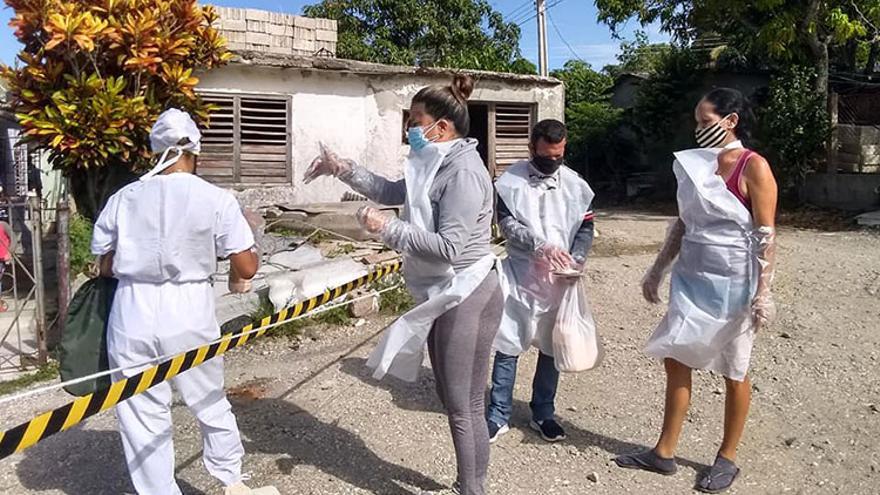
![]() 14ymedio, Havana, 17 August 2021 — With an incidence that exceeds 1,300 cases of Covid-19 per 100,000 inhabitants, the Santa Clara authorities have opted for the most drastic measure and imposed on the population the obligation to stay at home, as of this Wednesday, except for those issues that are absolutely essential. Work is also suspended immediately from the same day, until September 2.
14ymedio, Havana, 17 August 2021 — With an incidence that exceeds 1,300 cases of Covid-19 per 100,000 inhabitants, the Santa Clara authorities have opted for the most drastic measure and imposed on the population the obligation to stay at home, as of this Wednesday, except for those issues that are absolutely essential. Work is also suspended immediately from the same day, until September 2.
The mobility limitation measure for the 220,000 inhabitants of the provincial capital is strict from 1 pm, leaving the morning available to perform those tasks that cannot be postponed. Only health personnel and other workers linked to the fight against the pandemic can be in the streets. For the same reason, it is forbidden to stay in collective spaces, such as parks or sports areas, which will be blocked off for effective control.
With regard to employment, in addition to the companies and entities that contribute directly to the epidemiological situation, the sectors of food production and essential services will continue to work, including energy, aqueducts, communal services, telecommunications and exports. In all of them, however, in-office work is cancelled, although teleworking should be encouraged.
The hours of the stores are restricted from Monday to Friday, from 8 a.m. to 12 p.m., leaving only those that sell in freely convertible currency for hygiene products and food. The ration stores will remain open longer, from Monday to Saturday from 7 to 12 and with a special schedule (3 to 6 pm) for milk, bread and meat, which is available only on an exceptional basis, although the authorities ask Cubans to resort to courier services.
As for the staple products of Tiendas Caribe and Cimex linked to Bodegas del Comercio, sales will be organized so that on August 21 they can close completely until September 2.
Food services will be targeted to people and areas in isolation, with home deliveries and take-away services prohibited, as is the sale of unrationed cigarettes, beers, rum and coffee, which are now regulated.
The agricultural products will continue to be sold at the established points or mobile carts as modules that will be sold in the communities at home, in addition these combos will also be assembled for those who are isolated.
Retail sales and service activities are paralyzed with the exception of those of food, transporters, locksmiths, bike repairs, mechanics, masons and production of construction materials, which can operate from 12 noon from Monday to Friday. Other sectors with restricted or stratified services and hours are banking and pharmacies.
Another of the most contentious points along with food is transport, where crowds of people gather without the required distance. In this case, the restrictions are maintained, with the paralysis of the state and leaving the non-state one in operation from 5:00 am to 1:00 pm, only for humanitarian issues.
The Santa Clara authorities have warned that there will be a specific number to request private transportation at any time, but this must be for emergencies (for the sick or deceased).
Among the restrictions, it has also been warned that the closure of borders will be rigorous “seeking not to enter the municipality or exit for issues that are not strictly humanitarian and those prioritized in the economy,” although it has not been clarified whether tourism will be part of protected activities.
The measures are taken at a very critical moment of the spread of Covid-19 in the province. The authorities indicated that in Hospital Chambery, Centro, Condado Norte y Sur, Vigía Sandino, Camacho Libertad and José Martí, cases exceed 250 daily and no improvement is expected in the short term. “This leads us and forces us to an increase in rigor,” they argued.
The obligation to stay at home is the most decisive measure used to cut the transmission of the virus in the world and was used with special rigor in several European countries at the beginning of the pandemic. In Spain, the measure lasted for just over two months, with a complete stoppage of face-to-face employment for a week; and in France it has been used intermittently even in 2021.
The usefulness is unquestionable at the epidemiological level because it supposes the cutting of transmission to minimum levels, but its reverse is the blow it supposes for the economy. The members of the European Union had to agree to multimillion-dollar funds to compensate and help cover the closures and losses in many companies, in addition to supporting state plans and allowing unpublished indebtedness to date.
Cuba, however, does not have that cushion, something that has probably influenced the resistance of the authorities to decree these type of measures, which were only applied in Pinar del Río last April and occasionally in a neighborhood of Havana.
A division of opinion is reflected among the people of Santa Clara. Some of them have questioned the measure on social networks, because of the damage it will cause to an already very impoverished population, and among those who approve it, there are those who wonder why it has been necessary to wait for so many deaths to get serious.
____________
COLLABORATE WITH OUR WORK: The 14ymedio team is committed to practicing serious journalism that reflects Cuba’s reality in all its depth. Thank you for joining us on this long journey. We invite you to continue supporting us by becoming a member of 14ymedio now. Together we can continue transforming journalism in Cuba.
